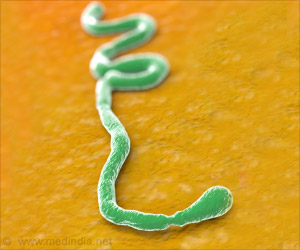Highlights:
- Large randomized, placebo-controlled, phase 2 clinical trial in Liberia show that two candidate Ebola vaccines pose no major safety concerns.
- The vaccines elicit immune responses by one month after initial vaccination that last for at least one year.
- The study included 1,500 adults and began during the West Africa Ebola outbreak.
Overview of the study
The study tests the efficacy of two candidate vaccines, chimpanzee adenovirus 3 vaccines, (CAd3-EBOZ) and the recombinant vesicular stomatitis virus vaccine (rVSV-ZEBOV) and began during the West Africa Ebola outbreak. The trial is being conducted by a U.S.-Liberia clinical research collaboration known as the Partnership for Research on Ebola Virus in Liberia (PREVAIL), established in 2014 in response to the request from the Liberian Minister of Health to the U.S. Secretary of Health and Human Services. The trial is sponsored by the National Institute of Allergy and Infectious Diseases (NIAID).
Study
The study included a total of 1,500 participants including men and women above the age of 18 with no reported history of Ebola virus disease. The participants were divided into three groups with 500 people in each and were followed for 12 months. The volunteers received one of the vaccine candidates or a placebo (saline injection). Participants were asked to provide blood samples before vaccination and again at one week, one month, six months and one year post-vaccination. Investigators then tested each of these samples for antibodies to the Ebola virus.
Results
- One month response: 71 percent of cAd3-EBOZ recipients and 84 percent of rVSV-ZEBOV recipients developed an antibody response compared to 3 percent of placebo recipients.
- One year response: 64 percent of cAd3-EBOZ recipients and 80 percent of rVSV-ZEBOV recipients had an antibody response compared to 7 percent of placebo recipients.
- Adverse side effects: 20 participants had a serious adverse event, including 6 CAd3-EBOZ recipients, 6 in rVSV-ZEBOV recipients and 8 in the placebo group.
- However, a total of 70% of the serious adverse events in the first 30 days after injection were attributed to malaria.
- Overall, investigators did not identify any major safety concerns related to the vaccines.
"This clinical trial has yielded valuable information that is essential for the continued development of these two Ebola vaccine candidates and also demonstrates that well-designed, ethically sound clinical research can be conducted during an epidemic," said NIAID Director Anthony S. Fauci, M.D. "A safe and effective vaccine would be a critically important addition to classical public health measures in controlling inevitable future Ebola outbreaks."
Reference:
- Kennedy SB, Bolay F, Kieh M, et al. Phase 2 placebo-controlled trial of two vaccines to prevent Ebola in Liberia. N Engl J Med 2017;377:1438-1447















